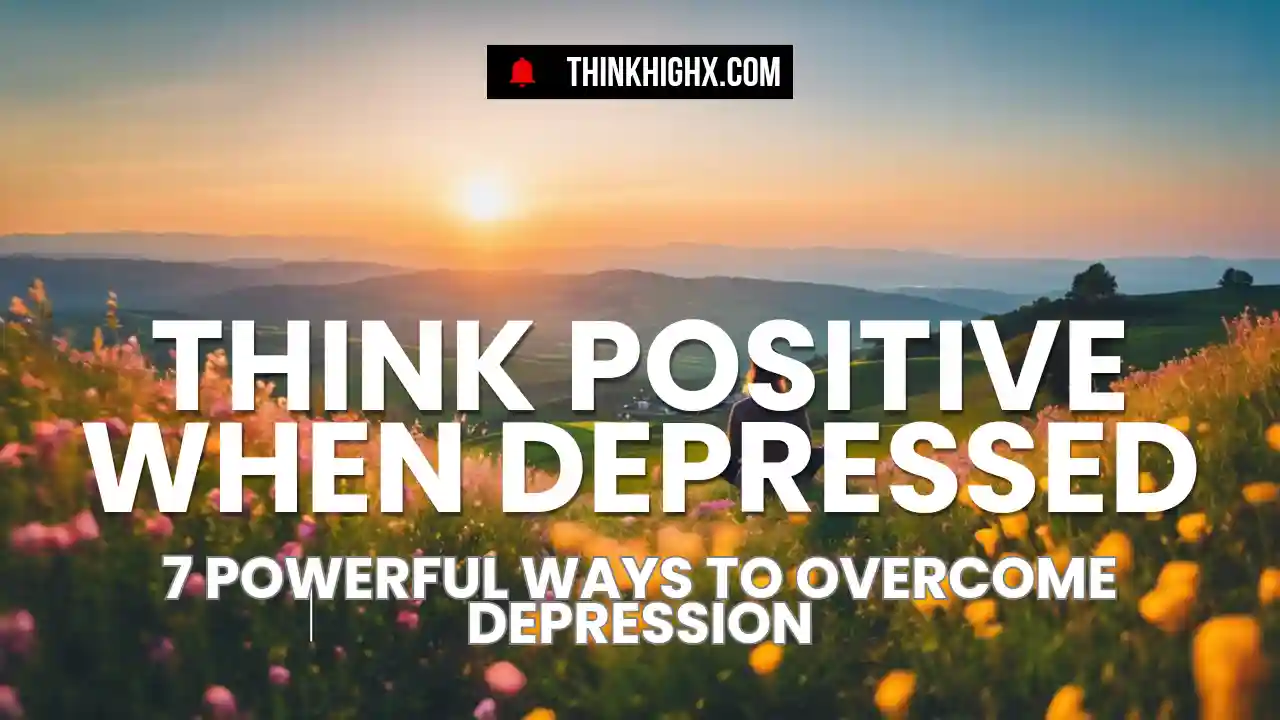Think Positive When Depressed: 7 Powerful Ways to Overcome Depression
Table of Contents

"Positive thinking will let you do everything better than negative thinking will."
Zig Ziglar
Introduction
Feeling depressed can make it seem impossible to think positively. I understand how challenging it can be because I have seen many face similar struggles. When depression takes over, our thoughts can spiral into negativity, making daily life harder. But, learning how to think positive when depressed is a powerful skill that can change everything. Positive thinking, although not an instant cure, helps in managing and easing the effects of depression. In this article, I will share practical insights on how to develop a positive mindset during challenging times, offering steps to turn negativity into hope.
Understanding the Link Between Depression and Negative Thoughts
What Causes Negative Thinking in Depression?
Negative thinking often feels like an inseparable part of depression. To think positive when depressed, your mind tends to focus on the worst possible outcomes only, making it hard to see any positives. This happens because depression alters brain chemistry, making it harder to feel hopeful or optimistic. Stress, past traumas, and negative life events can all contribute to the cycle of depressive thoughts. Understanding that these thought patterns are influenced by depression is the first step toward breaking free from them.
How Negative Thinking Affects Daily Life
Depressive thoughts do not just stay in the mind; they spill over into every aspect of life. You might find it hard to get out of bed, complete tasks, or even enjoy things you used to love. This constant negativity drains energy and motivation, making everything feel heavier. Over time, this can lead to a lack of productivity, strained relationships, and even physical health problems. The more you dwell on negative thoughts, the harder it becomes to escape from the grip of depression.
Well, you might ask ‘Is there even a way out to think positive when depressed?’ The answer is yes and we will learn how.
Watch: Stay Positive
The Power of Positive Thinking in Mental Health
Why Positive Thinking is Important
Before starting to learn to think positive when depressed, let us see why positive thinking is important. Adopting a positive mindset is like offering yourself a lifeline. When you shift your focus to positive thoughts, you can slowly begin to lift yourself out of the darkness of depression. Positive thinking does not mean ignoring reality, but rather choosing to focus on what is going right instead of dwelling on what is wrong. Studies show that positive thinking improves mood, reduces stress, and can even enhance overall well-being. When you start seeing life through a more hopeful lens, you allow yourself to heal emotionally and mentally.
How Positive Thinking Affects Brain Chemistry
Your brain responds to your thoughts, whether they are negative or positive. Positive thinking boosts brain chemistry by releasing endorphins and other feel-good chemicals that improve mood. These natural chemicals help combat feelings of sadness and hopelessness, which are common in depression. Over time, consistently practicing positive thinking can reshape your brain’s pathways, making it easier to maintain a healthier mindset.
This is the power of the brain that It can rewire itself to think positive when depressed but only at your consistent and determined will to do so.
Practical Tips to Think Positive When Depressed
Start with Small Positive Habits
When feeling overwhelmed by depression, even the simplest tasks can seem daunting. However, the key to cultivating positive thinking begins with small steps. One powerful habit to develop is gratitude journaling. Every day, take a few moments to write down three things you are grateful for. They do not have to be big or life-changing—small things like a nice meal or a peaceful moment in your day can work wonders. The point is to train your mind to focus on positive aspects of life, no matter how small. These however small steps, it builds up a habit enabling your brain to make it possible to think positive when depressed and that is, for sure, your goal when you are depressed or very sad.
Acknowledging even the tiniest progress is crucial. When you recognise small wins, like getting out of bed or completing a task, it helps shift your focus away from the negativity that depression often brings. Over time, these small positive habits will add up, creating a foundation for a more optimistic outlook.
Reframe Negative Thoughts into Positive Ones
A powerful strategy to think positive when depressed is learning to reframe negative thoughts. Depression can cause our minds to get stuck in negative thought patterns, where we believe the worst about ourselves or our situation. To counter this, start by identifying those negative thoughts. For example, if you catch yourself thinking, “I always fail,” challenge it by asking, “Is that really true?” Often, we generalise or exaggerate when feeling low.
Once identified, replace these negative thoughts with positive affirmations. Instead of “I always fail,” try telling yourself, “I am capable of learning from my mistakes, and I can improve.” This simple shift in mindset takes practice, but over time it helps in rewiring your brain to focus on the positive aspects of life rather than dwelling on the negative.
Surround Yourself with Positivity
The environment and people you surround yourself with have a significant impact on your mindset. When you are dealing with depression, it is easy to isolate yourself or spend time with people who may not support your well-being. Instead, seek out positive influences—friends who uplift you, a peaceful and organised living space, or even engaging in uplifting books or media.
I have found that during some of my lowest points, the company of positive, understanding friends helped immensely. They did not necessarily need to solve my problems, but just being around positive energy helped shift my perspective. Your environment shapes your thoughts, so actively choose to be in spaces and around people who inspire positivity.
Mindfulness and Meditation: Tools for Positive Thinking
How Mindfulness Improves Mental Health
Mindfulness is an excellent tool for managing depression and negative thoughts. By practicing mindfulness, you train your mind to stay in the present moment rather than getting lost in worries about the past or future. Mindfulness helps you become more aware of your thoughts without letting them control your emotions. When you notice a negative thought, mindfulness allows you to acknowledge it without judgment and then let it pass, instead of getting caught up in it.
For beginners, a simple mindfulness technique involves focusing on your breathing. Take deep breaths and notice how your body feels as the air moves in and out. This helps ground you in the present, reducing anxiety and negative thinking. With consistent practice, mindfulness can become a powerful ally in your journey to think positive when depressed.
Meditation for Positive Thinking
Meditation, when practiced regularly, can help you cultivate a more positive mindset. By calming the mind, meditation creates space for positive thoughts to flourish. During meditation, you focus on your breath or a calming word, which helps to quiet the negative chatter in your mind. As you become more skilled in meditation, you may notice that your negative thoughts lose their power over you.
To start, try a simple meditation exercise. Find a quiet place, sit comfortably, and close your eyes. Focus on your breathing—inhale deeply and exhale slowly. If your mind wanders, gently bring your attention back to your breath. Even a few minutes of meditation each day can gradually improve your mental outlook and help you build a habit of thinking positively.
Overcoming Challenges to Staying Positive
How to Deal with Setbacks
Setbacks are a natural part of life, and no journey to think positive when depressed is free from them. The key is to recognise that setbacks are not failures; they are opportunities to learn and grow. When things do not go as planned, it is important to pause, reflect, and reassess your approach. Instead of being overwhelmed by frustration, try to see what the setback is teaching you. Is there something you could do differently next time? Could this be an opportunity to improve?
One example comes from a friend of mine who faced several challenges while trying to launch his business. Every time he encountered a hurdle, whether it was financial trouble or a failed partnership, he chose to learn from the experience rather than give up. Over time, those setbacks helped him refine his strategies and ultimately succeed. By treating setbacks as lessons, you can keep moving forward without losing your sense of optimism.
Building Resilience and Patience
Resilience is the ability to bounce back from difficulties, and it is essential for maintaining a positive mindset. Life will not always go smoothly, and developing resilience helps you to stay grounded and hopeful, even when things are tough. Building resilience starts with accepting that challenges and setbacks are part of the process. Instead of feeling defeated, view them as opportunities to strengthen your character.
Patience also plays a critical role. To think positive when depressed does not happen overnight, and progress can be slow. Cultivating patience allows you to accept gradual progress without becoming discouraged. One practical way to build patience is through goal setting. Set small, achievable goals and celebrate each one. Over time, these small wins will build up, helping you stay motivated and resilient as you work toward a more positive mindset.
How Technology is Helping with Positive Thinking
In recent years, technology has opened up new avenues for supporting mental health and promoting positive thinking. Mental health apps like Headspace and Calm offer guided meditations, mindfulness exercises, and mood trackers, which can be incredibly useful for those seeking to improve their mental well-being. These apps provide easy access to tools that help users manage stress, reduce anxiety, and foster a more positive outlook. This helps pushes you closer to think positive when depressed.
Additionally, online therapy platforms such as BetterHelp and Talkspace have made mental health services more accessible than ever before. Through these services, individuals can connect with licensed therapists from the comfort of their own homes. These platforms are breaking down barriers to mental health care, making it easier for people to get the support they need to maintain a positive mindset.
Step-by-Step Guide to Building a Positive Mindset
Daily Habits to Foster Positivity
Building a positive mindset starts with simple, consistent daily habits. By making small adjustments to your routine, you can gradually shift your mindset toward positivity. Here is a step-by-step guide that you can start right away:
- Morning Gratitude: Begin your day by writing down three things you are grateful for. This practice helps you focus on the positive aspects of your life, setting a positive tone for the rest of the day.
- Positive Affirmations: Create a list of affirmations that resonate with you. These could be simple phrases like “I am capable,” or “I will overcome today’s challenges.” Say them out loud to reinforce a positive self-image.
- Mindful Breathing: Take five minutes every morning to practice mindful breathing. Sit quietly, focus on your breath, and let go of any negative thoughts that come to mind. This helps reduce stress and clears your mind.
- Set Intentions for the Day: Before you start your daily tasks, set a positive intention for the day. Whether it is “I will handle everything calmly” or “I will find joy in my work,” setting intentions helps guide your mindset.
- Evening Reflection: At the end of the day, reflect on what went well. Write down any small victories or positive moments you experienced, no matter how minor they may seem. This reinforces your focus on positivity and helps you sleep with a peaceful mind.
These steps are easy to incorporate into your routine and, with time, they can make a significant impact on your overall mindset that ultimately leads to think positive when depressed.
Personal Experience and Case Studies
I remember a close friend of mine who once struggled with negative thinking. He was stuck in a job that he did not enjoy, and every day felt like a battle against self-doubt and frustration. After a conversation where I suggested focusing on small, positive habits, he decided to give it a try. He started with simple steps—gratitude journaling and morning affirmations.
At first, the changes were subtle, but over a few weeks, he noticed a shift. He became more aware of the positive things around him, even in his challenging job. Slowly, his mindset began to change. He stopped focusing on what was wrong and started seeing opportunities for improvement. Eventually, he found the courage to apply for a new job that better suited his interests and skills.
The key lesson here is that building a positive mindset is a gradual process. It takes time, but the small steps you take every day can lead to a profound transformation. By focusing on what you can control—your thoughts and reactions—you can create a ripple effect that changes your life for the better.
Conclusion
In this journey through mastering the art of thinking positive when depressed, we have explored practical ways to shift your mindset and build a life filled with hope and resilience. We discussed how to start small by adopting simple habits like gratitude journaling, reframing negative thoughts, and surrounding yourself with positive influences. Through mindfulness and meditation, we can further enhance our mental well-being, while the power of resilience helps us stay strong through setbacks.
The importance of thinking positively when facing depression cannot be overstated. It is a skill that, with patience and practice, can help improve not just your outlook but your overall mental health. By following the tips shared in this article, you can begin to take control of your thoughts, no matter how overwhelming life feels.
Now is the time to take action. Start applying these steps to your daily routine and notice the gradual shift in your mindset. Feel free to share your own experiences and growth with others or seek out additional resources if you need further guidance. Your path toward positivity starts here, and every step counts.
Additional Resources
Books on Positive Thinking and Mental Health
- “The Power of Positive Thinking” by Norman Vincent Peale
This classic book offers timeless wisdom on how to reframe your mindset and live a life of confidence and peace. It’s a great starting point for anyone looking to change their thought patterns.
- “The Happiness Advantage” by Shawn Achor
Based on research in positive psychology, this book shows how happiness can fuel success. It is full of practical strategies for creating a positive, productive life.
- “Mindset: The New Psychology of Success” by Carol S. Dweck
This book explains how our mindset shapes our lives. Dweck’s insights into the “growth mindset” versus the “fixed mindset” can help readers understand how positivity fuels success.
Online Courses and Webinars
- “The Science of Well-Being” by Yale University (Coursera)
This free course teaches the science behind happiness and well-being, helping you develop habits that support positive thinking and mental health.
- “Positive Psychology: Resilience Skills” by University of Pennsylvania (Coursera)
Learn practical strategies to build resilience, which is crucial for maintaining a positive mindset during tough times.
Apps for Positive Thinking and Well-being
- Headspace: A meditation app that offers guided mindfulness and breathing exercises to help reduce stress and improve mental clarity. It’s a great tool for starting your mindfulness journey.
- Gratitude Journal: This app encourages users to jot down things they are grateful for each day. It’s a simple yet effective way to cultivate positive thinking through daily reflection.
- Calm: Calm provides guided meditations, sleep stories, and breathing exercises to help users manage anxiety and stay grounded. It’s ideal for developing a daily mindfulness practice.
By exploring these resources, you can continue your growth and fully embrace the benefits of positive thinking.
FAQs (Frequently Asked Questions)
Does positivity help depression?
Yes, positivity can help with depression. It encourages a shift in focus from negative thoughts to more hopeful ones, fostering resilience. Positive thinking, along with mindfulness, gratitude, and therapy, can support mental well-being by gradually improving mood and coping skills.
How to motivate yourself when you are depressed?
Start small by setting achievable goals, practicing self-care, and celebrating little victories. Surround yourself with supportive people, focus on positive affirmations, and try engaging in activities you once enjoyed. Breaking tasks into manageable steps can slowly build motivation over time.
How to find joy in life when depressed?
Begin by appreciating small, simple moments, such as a walk outside or a favorite hobby. Engage in activities that bring comfort and connection, and seek support from loved ones. Finding joy may require patience, but mindfulness and gratitude can help rediscover happiness in everyday experiences.
How to stay positive when depressed?
Stay positive by practicing gratitude, reframing negative thoughts, and surrounding yourself with supportive people. Engage in activities that uplift you, such as exercise or mindfulness. Building small, daily habits that foster self-compassion and seeking professional help can also maintain a positive outlook.
What are 5 positive attitudes?
Five positive attitudes include optimism, gratitude, resilience, kindness, and self-compassion. These attitudes foster mental well-being, help manage stress, and encourage a positive outlook on life. Practicing them regularly can lead to greater emotional stability and happiness.
What are 4 ways to avoid depression?
Four ways to avoid depression include maintaining a healthy lifestyle through regular exercise, building strong social connections, practicing mindfulness, and managing stress. Establishing routines that promote physical and mental well-being can help prevent feelings of depression from developing.
Why do I feel so unhappy?
Feeling unhappy may stem from unmet expectations, stress, or life changes. Lack of fulfillment, isolation, or unresolved emotions can also contribute. Identifying the root cause and seeking support, practicing self-care, or talking to a professional may help improve emotional well-being.




